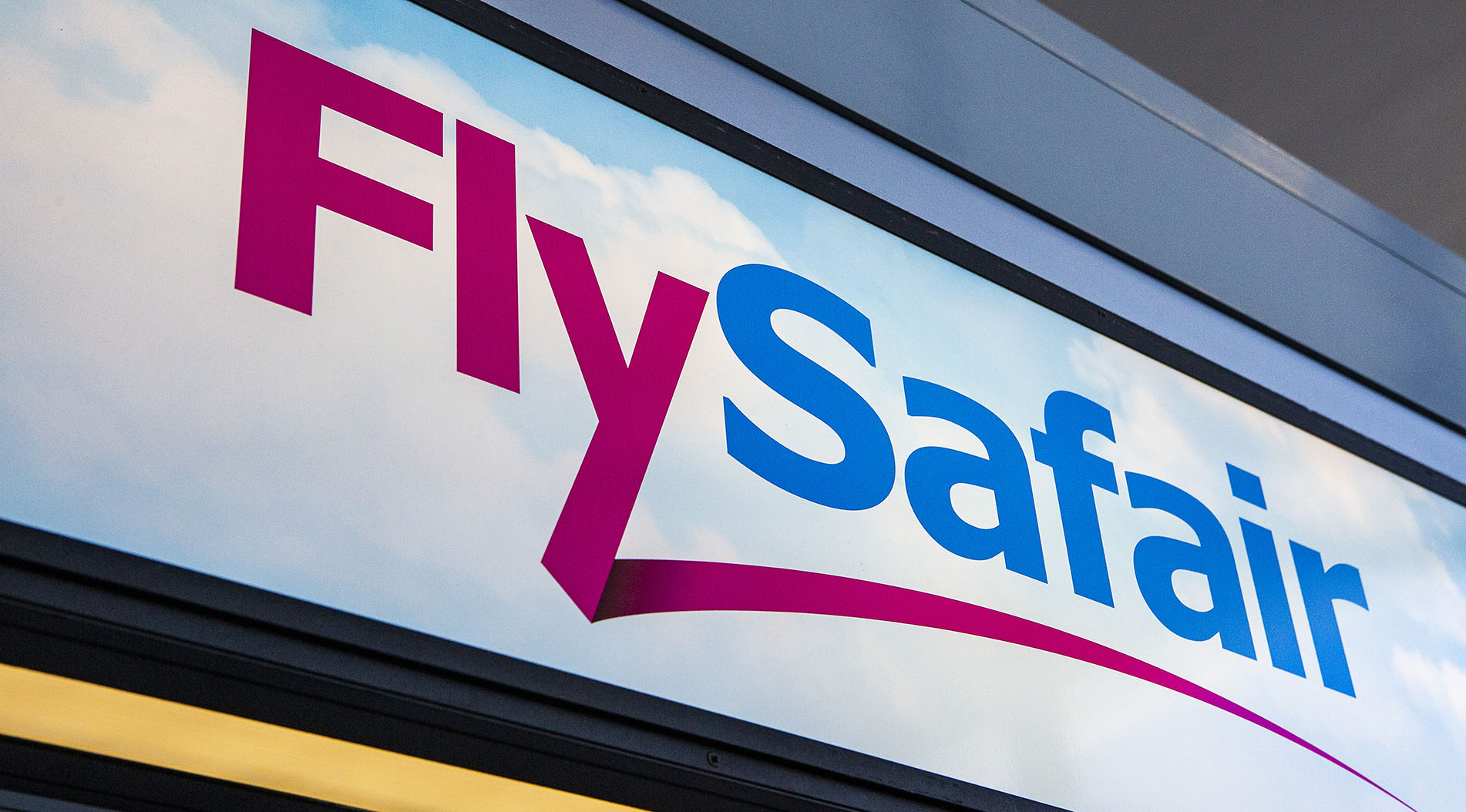FlySafair could be forced to amend its ownership structure and possibly open it to local investors because the low-cost carrier is predominantly owned by foreigners, which is in breach of South African laws and aviation licensing conditions.
If FlySafair fails to introduce local investors/shareholders, the low-cost carrier could have its aviation licence cancelled or suspended, which would effectively ground flights operated by the company.
This would arguably be a disaster considering that FlySafair is a large airline that the domestic aviation market depends on for movement across the country. The airline has captured 60% of the domestic aviation market and has mopped up flight capacity left open by the collapse of at least 11 domestic airlines since it began operations in October 2014. FlySafair also operates flights outside of South Africa, including Zimbabwe, Zanzibar, and Mauritius, which comprises less than 4% of its total flight capacity.
Questions about FlySafair’s ownership structure have surfaced after the International Air Services Council (an aviation authority) ruled that the airline is majority foreign-owned. Thus, its shareholding structure is not compliant with local laws and regulations.
An International Air Services Council investigation found that an Ireland-based company, ASL Aviation Holdings, effectively owns 74.86% of FlySafair through an investment holding company. According to the International Air Services Council, this is in contravention of local laws, mainly sections of the Air Services Licensing Act.
The Act requires that holders of aviation licences in South Africa have a minimum of 75% local shareholding. In other words, airlines that fly locally are required to be owned by individuals who are “residents” of the country. The 75% requirement also extends to voting rights over how airlines are managed.
The government passed the Act to ensure South Africa-based shareholders and investors become custodians of airlines and interests in the local aviation industry. The International Air Services Act also requires airlines based in the country and flying overseas to have a “substantial” local shareholding. The airline industry has interpreted this to be a minimum of 51%.
The decision by the International Air Services Council’s affects FlySafair’s licence that allows it to operate flights outside of South Africa.
The unfavourable finding by the International Air Services Council against FlySafair was in response to a complaint lodged by the airline’s competitors, Airlink and Global Airways (which co-owns the domestic airline Lift), which urged the aviation authority to probe FlySafair’s ownership structure and determine whether it complied with legislation.
Airlink and Global Airways have also approached the Air Services Licensing Council, another authority.
In its findings, the International Air Services Council relied on the evidence submitted by FlySafair’s competitors. In one of their submissions, the competitors pointed the International Air Services Council to the disclosure by ASL Aviation Holdings in its 2020 financial statements, where it confirmed that Safair Operations (the parent company of FlySafair) is its subsidiary, owning 74.86% of the company. Furthermore, in its 2022 financial statements, ASL Aviation Holdings confirmed that subsidiaries (in this case, FlySafair) were controlled by it.
In its four-page letter informing all parties of its findings and ruling, the International Air Services Council found that Safair’s voting rights were substantially “held by ASL [Aviation Holdings], a company incorporated outside of the Republic”, and Safair’s “international air service is actively and effectively controlled by ASL”.
The International Air Services Council’s full ruling and sanction against FlySafair are set to be issued by the end of November 2024.
The local authority could cancel or suspend Safair’s aviation licence (effectively grounding flights operated by FlySafair) until its shareholding structure is fixed, impose fines or penalties against FlySafair, or give FlySafair more grace (no sanctions) and time to fix its shareholding structure by possibly selling shares in the company to locals.
FlySafair responds
Kirby Gordon, FlySafair’s chief marketing officer, told Daily Maverick on Wednesday, 6 November, that the company would explore its options later this month or once the International Air Services Council’s full ruling and sanction(s) had been unveiled.
In the interim, FlySafair believes that its ownership structure remains “within the bounds of both the letter and spirit of the law”, and the company “remains committed to full compliance with all applicable South African laws and regulations”.
“We understand the importance of transparency, foreign involvement limitations, and the role of responsible corporate governance in building trust with our valued customers, partners, regulators and the public… We affirm that our intention is, and has always been, to be compliant with prevailing regulation.
“We have continued to serve South Africans proudly and have maintained control of our day-to-day operations locally. Our team remains firmly based in South Africa, and our primary focus is on delivering safe, reliable and affordable service to South African customers,” said FlySafair.
Industry reaction
An industry source and one of the parties to the complaint at the International Air Services Council told Daily Maverick that FlySafair competitors wanted only “fairness” and for the law to apply equitably to aviation players.
The source believes that being majority owned by foreign shareholders gave FlySafair access to international capital used by the airline to fund its operations and growth, allowing it to remain competitive.
Other South Africa-based airlines should also be allowed to open up their shareholding structure, added the source.
“Global investors like Emirates and Qatar are prepared to unleash capital into local airlines. However, laws currently prohibit them from doing so. Then the laws should be changed to allow us to attract foreign investors.” DM
Article amended to clarify that the decision by International Air Services Council affects FlySafair’s licence that allows it to operate flights outside of South Africa.





